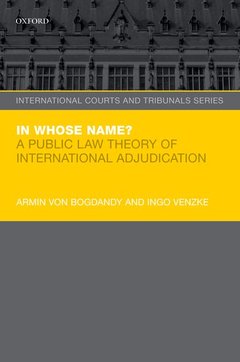In Whose Name? A Public Law Theory of International Adjudication International Courts and Tribunals Series
Langue : Anglais
Auteurs : von Bogdandy Armin, Venzke Ingo

The vast majority of all international judicial decisions have been issued since 1990. This increasing activity of international courts over the past two decades is one of the most significant developments within the international law. It has repercussions on all levels of governance and has challenged received understandings of the nature and legitimacy of international courts. It was previously held that international courts are simply instruments of dispute settlement, whose activities are justified by the consent of the states that created them, and in whose name they decide. However, this understanding ignores other important judicial functions, underrates problems of legitimacy, and prevents a full assessment of how international adjudication functions, and the impact that it has demonstrably had. This book proposes a public law theory of international adjudication, which argues that international courts are multifunctional actors who exercise public authority and therefore require democratic legitimacy. It establishes this theory on the basis of three main building blocks: multifunctionality, the notion of an international public authority, and democracy. The book aims to answer the core question of the legitimacy of international adjudication: in whose name do international courts decide? It lays out the specific problem of the legitimacy of international adjudication, and reconstructs the common critiques of international courts. It develops a concept of democracy for international courts that makes it possible to constructively show how their legitimacy is derived. It argues that ultimately international courts make their decisions, even if they do not know it, in the name of the peoples and the citizens of the international community.
Armin von Bogdandy is Director at the Max Planck Institute for Comparative Public Law and International Law, Heidelberg and Professor at the Goethe-University, Frankfurt. He is President of the OECD Nuclear Energy Tribunal and was a Member of the Scientific Committee of the European Union Agency for Fundamental Rights (2008-2013). He is Partner Investigator in the Exzellenzcluster "Normative Orders", Frankfurt, and Senior Research Fellow at the PluriCourts Centre for Excellence, Oslo. Ingo Venzke is Associate Professor at the University of Amsterdam. He was a Visiting Senior Fellow at National University of Singapore, Hauser Research Scholar at New York University, Visiting Scholar at Tel Aviv University and Research Fellow at the Max-Planck-Institute in Heidelberg. He is editor of the Leiden Journal of International Law and contributes to the research cluster on the exercise of public authority, Heidelberg.
Date de parution : 03-2016
Ouvrage de 326 p.
15.6x23.2 cm
Date de parution : 07-2014
Ouvrage de 304 p.
16.2x24 cm
Thème d’In Whose Name? :
© 2024 LAVOISIER S.A.S.



